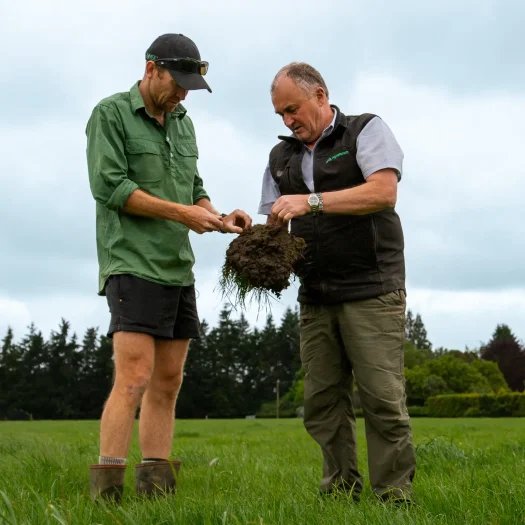Belfield Dairies
Geraldine, Canterbury

“We had compacted soil, were growing grass that the animals just didn’t want to eat so we were finding it hard to hit residuals and had animal health issues,”
— Andrew Grant

Farm type
Dairy
Before
- Compacted soil
- Low grass palatability and suppressed intake
- Nitrogen 290–300kg N/ha/year
- Blanket application of superphosphate up to 500kg/ha per year
- Few earthworms
After
- Open, flocculated soils with better water holding capacity and root growth
- Increase pasture intake
- Nitrogen <190kg N/ha/year
- Superphosphate replaced with a 110kg/ha per year slow-release phosphate and sulphur fertiliser
- Lots of earthworms
Products used
ComCat
EnviroCal
Owned by Andrew and Richard Grant, Belfield Dairies in Geraldine was first converted back in 2012. In a bid to boost pasture production, they applied up to 400 units of nitrogen alongside plenty of phosphorus, and while the results were pleasing to the naked eye, the cows were telling a different story.
They started working with a veterinarian and Managing Director of Agraforum NZ Allan Piercy to see what improvements they could make to their fertiliser regime to get better results from their pasture.
“Different farms have different problems, many of the issues you see on farm in the animal health space can often be linked back to poor nutrition caused by low-quality food being grown in poor soil structure that necessitates increased fertiliser inputs to produce enough drymatter.”
Benchmark soil testing found that the farm had soils with low phosphate and sulphur retention and a large range in soil fertility, producing from 19t drymatter per hectare to 9t. To improve some of the issues limiting pasture production and quality, the first step was reversing compaction issues and opening up the soil structure so the pasture could get access to the nutrients required.
While Andrew says it was hard to get a spade in the ground previously, since using a combination of Agraforum products like ComCat and EnviroCal and making some adjustments to their fertiliser type and regime, he can easily dig up a square of lovely, flocculated soil filled with worms.
ComCat is a plant biostimulant that drives root growth and increases the natural resistance of plants. EnviroCal is a source of ionised calcium that increases flocculated soil depth to bolster water-holding capacity for better drought resistance and access to soil nutrients.
“The proof is in the intake though, the cows are loving their grass,” Andrew says.
The most noticeable improvements can be seen in water-holding capacity leading to less irrigation and improved grass palatability boosting intake.
“The cows seem much more content with the pasture now with fewer health issues. The nutrient advice we get from the Agraforum team is based on a whole system approach and is independent of where we purchase the bulk of our fertiliser.
